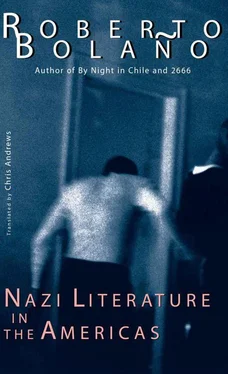In the same year, 1974, Argentino Schiaffino managed to publish two more works. A short manifesto in With Boca , entitled “Satisfactory Solutions,” which is, in a sense, a sequel to The Presidential Summit (Latin America should respond to total football, he suggests, by physically eliminating its finest exponents, that is to say, assassinating Cruyf, Beckenbauer, et cetera). And a new collection of poems (a hundred mimeographed copies): Spectacle in the Sky , a series of short, light — one might almost say winged — poems about the stars of Boca Juniors down through the years, not unlike Italo Schiaffino’s famous book The Path to Glory . The theme is the same, the technique is similar, some metaphors are identical, yet where the elder brother’s work is ruled by rigor and the determination to record a history of striving, the younger brother yields to the pleasure of discovering images and rhymes, treats the old legends humorously but not without affection, applies a light touch where Italo was grave, and mounts a powerful and occasionally opulent verbal display. This book probably contains the best of Argentino Schiaffino’s work.
Some years of literary silence followed. In 1975 he got married and started working in an auto repair shop. After which he is said to have hitch-hiked to Patagonia, read everything he could lay his hands on, submerged himself in the study of the history of the Americas, and experimented with psychotropic drugs, but what we know for certain is that he was there with his brother’s gang every week, whether the game was at home or away, cheering with the best of them. During this period he is also said to have participated in the activities of Captain Antonio Lacouture’s death squad, driving and repairing a small fleet of cars kept at a villa on the outskirts of Buenos Aires, but of this there is no proof.
During the 1978 World Cup, which was hosted by Argentina, Fatso resurfaced with a long poem entitled Champions (1,000 mimeographed copies, which he sold himself at the stadium’s entrances and exits): a rather difficult and occasionally muddled text, which jumps abruptly from free verse to alexandrines, to distichs, to rhyming couplets and sometimes even to catalectics (when exploring the ins and outs of the Argentinean selection it adopts the tone of Lorca’s Romancero gitano , and when examining the rival teams it veers between the devious advice of old Vizcacha in Martin Fierro and Manrique’s straightforward predictions in the “Coplas”). The book sold out in two weeks.
Then there was another long period of literary silence. In 1982, as he was to reveal in his autobiography, he tried to enlist as a volunteer to fight the British in the Falklands. He was unsuccessful. Shortly afterward, he traveled to Spain for the World Cup with a group of die-hard fans. After the defeat of the Argentinean team by Italy, he was arrested in a Barcelona hotel, on charges of assault, attempted homicide, robbery and disorderly conduct. He spent three months in Barcelona’s Model Prison along with five other Argentinean soccer fans, before being released for want of evidence. On his return, the Boca gang hailed him as their new leader, but uninspired by this promotion he generously delegated the role to Dr. Morazán and the contractor Scotti Cabello. Nevertheless, his moral authority over the followers of his late brother would remain undiminished to the end of his life, a life that for many of the younger fans had begun to take on the aura of legend.
With Boca folded in 1983, despite the best efforts of Dr. Morazán, thus depriving Fatso of his sole means of public expression; the deprivation, however, would prove beneficial in the long term. In 1984, a small politico-literary publisher, Black & White, brought out a volume entitled Impenitent Memoirs , Argentino Schiaffino’s first venture beyond the realm of self-publication, which was greeted with indifference by the literary set. It is a small volume of stories in a decidedly naturalistic mode. In less than four pages, the longest story evokes mornings and evenings spent playing soccer in a working-class neighborhood of Buenos Aires. The characters are four children who call themselves the Four Gauchos of the Apocalypse, and a number of hagiographers have taken their experiences to reflect the childhood of the Schiaffino brothers. The shortest story occupies less than half a page: jocular in tone and larded with Buenos Aires slang, it describes a sickness or a heart attack or perhaps simply a bout of melancholy afflicting some nameless, distant person in the course of an ordinary afternoon.
In 1985, the collection of stories Crazy Blunders appeared under the same imprint. At only 56 pages, it was even slimmer than its predecessor, to which, at first glance, it appeared to be an epilogue. This book did, however, attract some critical attention. One review summarily dispatched it as cretinous. One tore it to shreds, but without impugning Schiaffino’s feel for language. Two other reviewers (there were only four in all) were forthright and more or less enthusiastic in their praise.
Black & White went bankrupt soon afterwards, and Schiaffino seems to have lapsed not only into silence, as on previous occasions, but also into anonymity. It was suggested that his disappearance could be explained by the fact that he owned half or at least a significant proportion of the shares in Black & White. How Schiaffino got hold of enough money to have a substantial stake in a publishing company remains a mystery. There was some talk of funds obtained during the dictatorship, wealth stolen and secreted, undisclosed sources of income, but nothing could be proved.
In 1987 Argentino Schiaffino reappeared at the helm of the Boca gang. He had separated from his wife and was working as a waiter in a downtown restaurant on Corrientes, where his proverbial good humor soon made him one of the neighborhood’s favorite characters. At the end of the year he published three stories, none of which exceeded seven pages, in a mimeographed collection entitled The Great Buenos Aires Restaurant Novel , which he sold without compunction to his clients. The first story is about a Lebanese who arrives in Buenos Aires and looks for a solid business in which to invest his savings. He falls in love with an Argentinean woman who works as a butcher, and together they decide to open a restaurant specializing in meat of all kinds. Everything goes well until the Lebanese man’s poor relatives start turning up. In the end the butcher solves the problem by liquidating the relatives one by one, with the help of her kitchen hand and lover, nicknamed Monkey. The story ends with an apparently bucolic scene: the butcher, her husband and Monkey set off to spend a day in the country and prepare a barbecue under the wide open skies of the Fatherland. The second story is about an old magnate in the Buenos Aires restaurant business who wants to find his last love, and with that objective scours nightclubs, brothels, the houses of friends with grown-up daughters, et cetera. He finally discovers the woman of his dreams in his first restaurant: a twenty-year-old tango singer, blind since birth. The third story is about a group of friends dining in a restaurant which belongs to one of them and has been closed to the public for the evening. At first the occasion seems to be a stag night, then a celebration of something one of the friends has achieved, then a wake, then a gastronomical gathering with no other purpose than to enjoy good Argentinean cooking, and finally appears to be a trap set for a traitor by all or almost all the others, although, beyond vague mentions of trust, eternal friendship, loyalty and honor, we never learn what the supposed traitor has betrayed. The story is ambiguous and based entirely on the conversation of the diners at the table, whose number declines as the evening wears on, while their words become increasingly pompous and cruel, or, on the contrary, clipped, laconic and sharp. Regrettably, the story comes to a predictable, not to say gratuitously violent, end: the traitor is hacked to pieces in the restaurant bathroom.
Читать дальше












